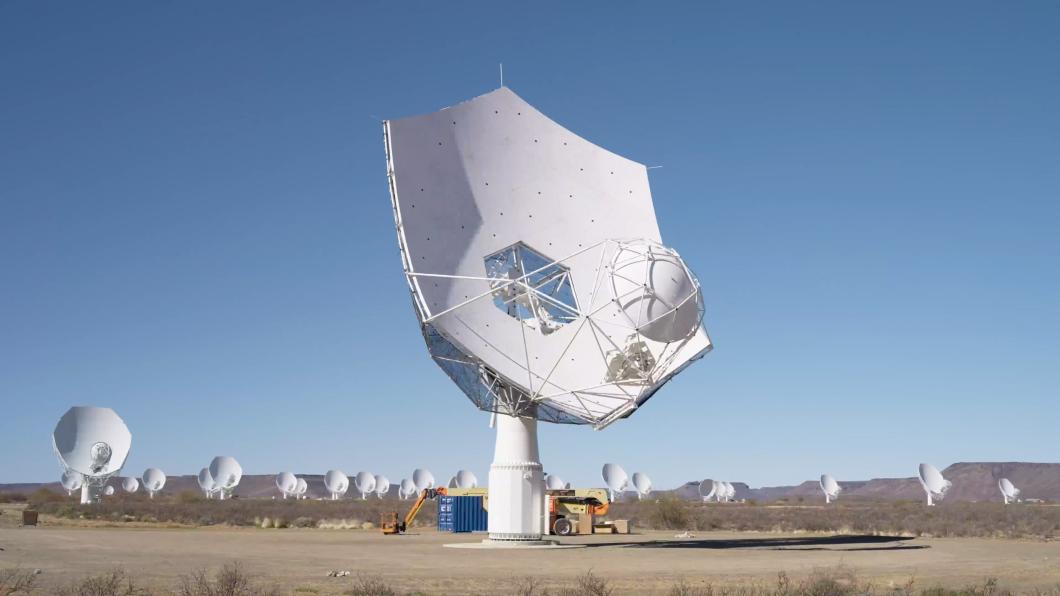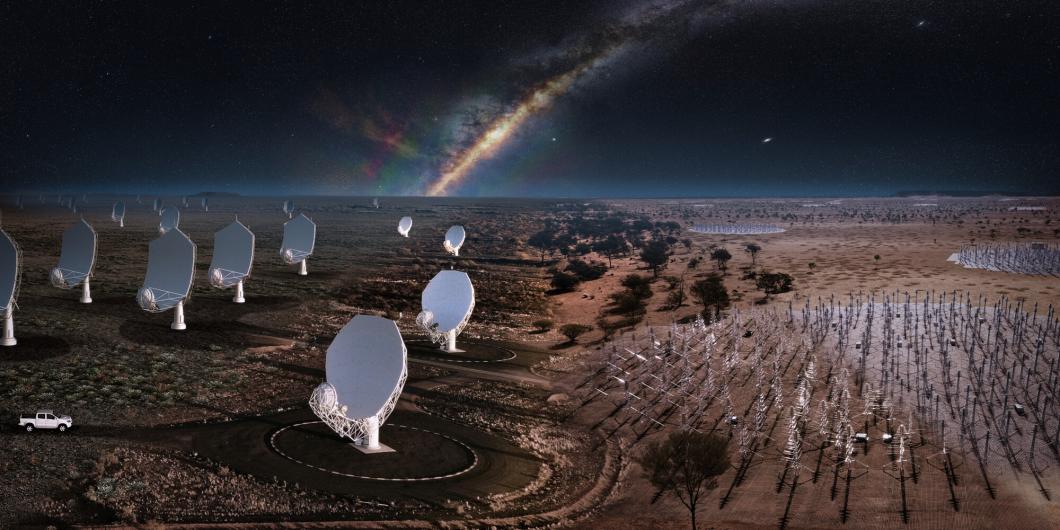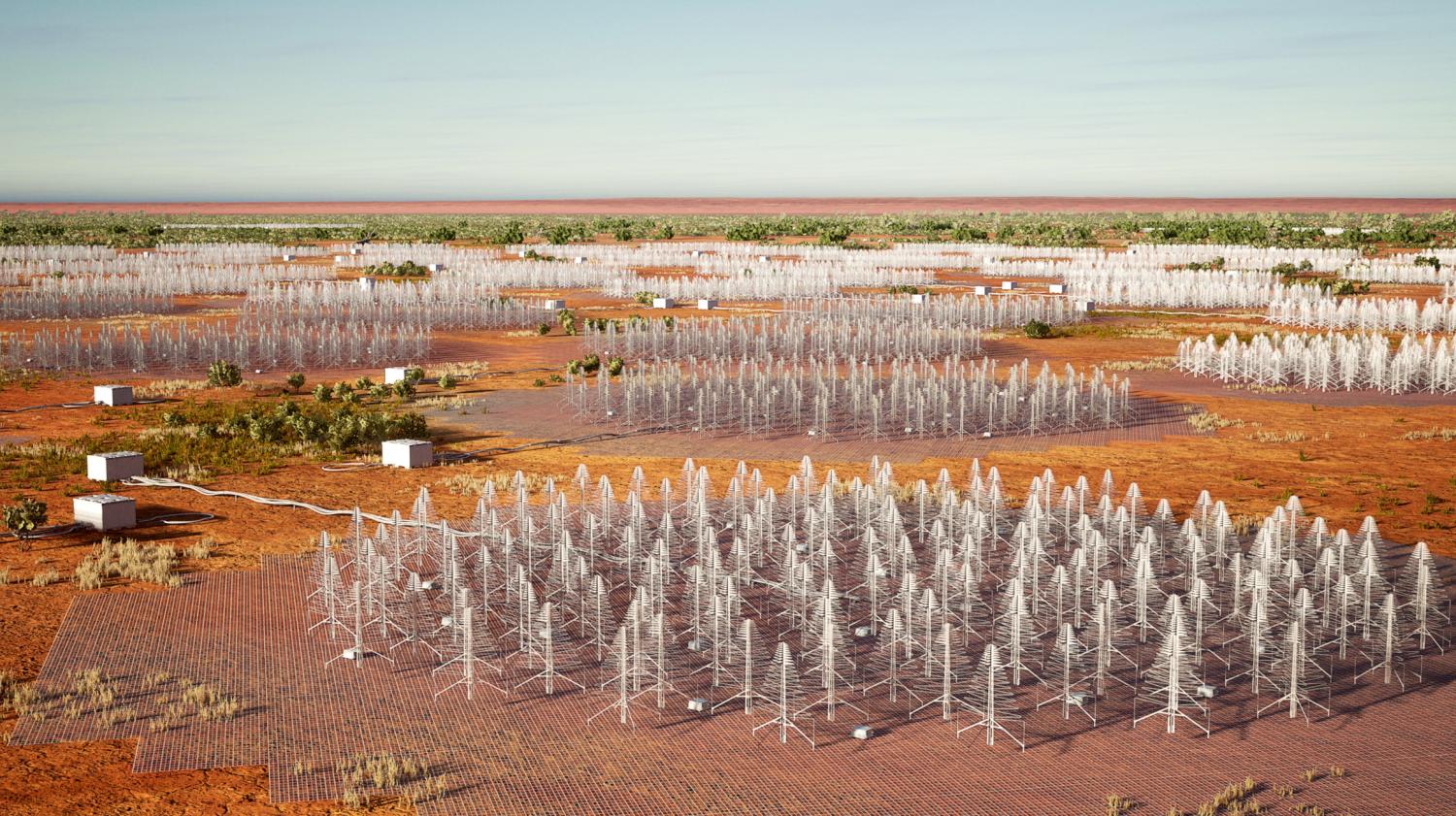Our construction journey
2024 year in review

Establishing our telescopes on site
At the close of the year, we look back at some of the significant activities and construction milestones that took place on our telescope sites in Australia and South Africa. From the delivery of the first telescope parts and their transport to our Northern Cape site in South Africa to the deployment of the first antennas on Wajarri Yamaji Country in Australia, the assembly of the first SKA-Mid dish on site, the first images and fringes using SKA-Low antennas, and ongoing infrastructure and construction work in both locations, 2024 was packed with progress in the telescope host countries and beyond across the Observatory.
As we look to 2025, the SKA Observatory and our collaboration partners SARAO, a national facility of the South African National Research Foundation, and CSIRO, Australia’s national science agency, continue to work hand in hand to deliver the SKA telescopes.

Synchronisation dance with MeerKAT
In August 2024, the first SKA-Mid dish tested its synchronisation with the MeerKAT telescope. This is not only a spectacular sight but also an important feature for when the dishes will eventually be part of the same array.
Four SKA-Low stations populated
By July 2024, the first four SKA-Low stations each had 256 antennas installed by field technicians. This aerial view shows two fully populated stations as part of the ‘S8’ cluster on the southern spiral arm of the SKA-Low telescope.
First SKA-Mid dish
The first dish structure for the SKA-Mid telescope, comprising the 9.5 m pedestal and panels for the 15-m-diameter main reflector, arrived in Cape Town in early 2024, after a more than 16,000 km journey from the manufacturing site in China. The 'big lift' of the main reflector onto its pedestal happened in July.
If you cannot play the video, click here for a downloadable version.
SKA-Low antenna rollout begins
In March 2024, the SKA-Low telescope began to take shape in Western Australia with the installation of the first antennas on site, marking a major construction milestone for the SKAO. The antennas, manufactured in Italy, are the first of 131,072 that will be installed over the coming years.
If you cannot play the video, click here for a downloadable version.

The SKAO recognises and acknowledges the Indigenous peoples and cultures that have traditionally lived on the lands on which the SKAO facilities are located. In Australia, the SKAO acknowledges the Wajarri Yamaji as the Traditional Owners and Native Title Holders of Inyarrimanha Ilgari Bundara, the CSIRO Murchison Radio-astronomy Observatory.
The construction timeline
Key project milestones
(as of June 2024)
SKA-Low | SKA-Mid | |
| Start of global construction activities | JULY | JULY |
| Earliest start of major contracts (C0) | AUGUST | AUGUST |
| Array Assembly 0.5 finish (AA0.5) SKA-Low = 4-station array SKA-Mid = 4-dish array | DECEMBER | OCTOBER |
| Array Assembly 1 finish (AA1) SKA-Low = 18-station array SKA-Mid = 8-dish array | NOVEMBER | JUNE |
| Array Assembly 2 finish (AA2) SKA-Low = 64-station array SKA-Mid = 64-dish array | OCTOBER | MAY |
| AA* SKA-Low = 307-station array SKA-Mid = 144-dish array, including 64 MeerKAT dishes | JANUARY | MARCH |
| Operations Readiness Review (ORR) | APRIL | JUNE |
| End of staged delivery programme | MARCH | MARCH |
| Array Assembly 4 finish (AA4) SKA-Low = full array SKA-Mid = full array |
|
|
Construction of the SKA telescopes will take eight years (including 18 months contingency), having begun in July 2021 following approval by the SKAO Council. The construction plan involves a staged approach, progressing through the delivery of a series of array assemblies (AA), as shown in the table (left), each incrementally adding more antennas to SKA-Low and SKA-Mid array, and with a growing suite of technical and scientific capabilities. This phased strategy means the SKAO can deliver the most effective instruments possible at each stage, maintain a continuously working and expanding facility, and manage the wide range of challenges encountered along the way.
The first array assembly (AA0.5), under construction in 2024, will develop the earliest possible working demonstration of the architecture and supply chain. By the completion of AA2, currently planned for the end of 2026 / early 2027, both telescopes will have achieved or surpassed the sensitivity of comparable existing facilities.
While the SKAO’s firm intention is to build the SKA design baseline of 197 SKA-Mid dishes and 512 SKA-Low stations (known as AA4), its initial focus is on delivering a preliminary array in line with the anticipated funding available. Known as AA*, it comprises a 144-dish array in South Africa (80 SKA-Mid dishes integrated with 64 MeerKAT dishes), and 307 SKA-Low stations in Australia.
The commissioning process, which tests that components work together as a system, will take place as we progress through each Array Assembly stage. Science verification will also begin while the telescopes are still under construction, carrying out end-to-end tests of the system based on proposals for astronomical observations from the SKAO user community. Commissioning and science verification ensure that the telescopes meet users' needs; carrying them out as each Array Assembly is constructed means any required adjustments can be made as early as possible in the process, minimising the risks as much as possible.
Following the completion of the construction of the AA* systems, an operations readiness review will take place to demonstrate the ability of the Observatory to execute a set of key observing modes, illustrated by end-to-end tests of representative science verification projects from proposal preparation to (public) data delivery.
Pre-construction development
Designing the SKA telescopes was a global effort by 12 international engineering consortia, representing hundreds of engineers and scientists in 20 countries over almost eight years in total. The international design process was overseen by the SKA Organisation, the SKAO's forerunner.
The engineering design consortia were responsible for the look and functionality of the different elements of the SKA project, ensuring that they would all perform together. Nine of the consortia focused on components of the telescope, each critical to the overall success of the project, while three others focused on developing advanced instrumentation for the telescopes and future systems. Each consortium had a designated lead institution, and operated in conjunction with a specialist project manager, domain specialists at the SKA Organisation Headquarters in the UK, and science working groups. Overall, some 600 experts were involved around the world in designing the SKA telescopes, including all systems and sub-systems.
Explore the different elements and the people behind them on our pre-construction design website.

Making the SKA telescopes a reality
The SKAO Construction Commencement Ceremonies, held at the telescope sites in Australia and South Africa on 5 December 2022, heralded a new era for the project: the formal start of construction of what will be the most advanced radio telescopes in the world.
This momentous event followed eighteen months of extensive procurement activities involving companies and institutions around the globe, culminating in the announcement at the ceremonies of more than 300 million euros of contracts, covering major infrastructure and the antennas for both the SKA-Low and SKA-Mid telescopes.
The infrastructure preparations through 2023 led to the first antennas arriving at the telescope sites in early 2024. Deployment of the first SKA-Low antennas took place on 7 March in Australia, the same day that the pedestal for the first SKA-Mid dish was erected in South Africa.
Throughout 2024, the construction teams continued to work on the delivery of the first stage of the SKAO's phased delivery plan, known as Array Assembly 0.5, which will be used to test the systems are working as expected.
We've been on a multi-decade journey and I am so excited to see construction starting in earnest.

VIDEO: Learn how partners across the globe are contributing to the SKA construction effort, developing the innovative technology demanded by the telescopes (transcript available on YouTube). If you can't see this video, click here.
The SKA world congratulates the Observatory
Ministers and representatives from SKAO partner countries deliver congratulatory messages to mark the SKA Construction Commencement Ceremonies on 5 December 2022.
We are honoured to take part in this exciting and challenging scientific project. Since 2017 we have been working and collaborating intensely with INAF and the SKAO to develop a product that could best fulfil characteristics and performances suitable to satisfy such an important task and it's incredible how the project on paper has finally become true.
The start of construction of the SKA telescopes and signature of the dish structure agreement marks a great milestone. The CETC54 team is honoured to take part in this mega science project. I would like to express my thanks to everyone involved in making this possible, from our technical team and cooperation partners from South Africa, Germany and Italy to the colleagues and friends from SKAO and the Ministry of Science and Technology.
We are thrilled to be partnering with the SKAO on this exciting and world-leading endeavour. To support the delivery of this project, nearly 100 new roles will be created for the Wajarri people and locals in the mid-west region of Western Australia.
The SKA project is truly a project of global importance and literally universal impact. Adenco Construction is proud to be associated with and working on the SKA project and being part of a South Africa and Africa based project working with a team of international experts.
The SKAO’s member states firmly believe in the potential for scientific discovery to contribute to advances in technology and innovation, and to deliver a broader benefit for industry and society. As such, they have made impact on society core to the mission of the observatory since its inception.












